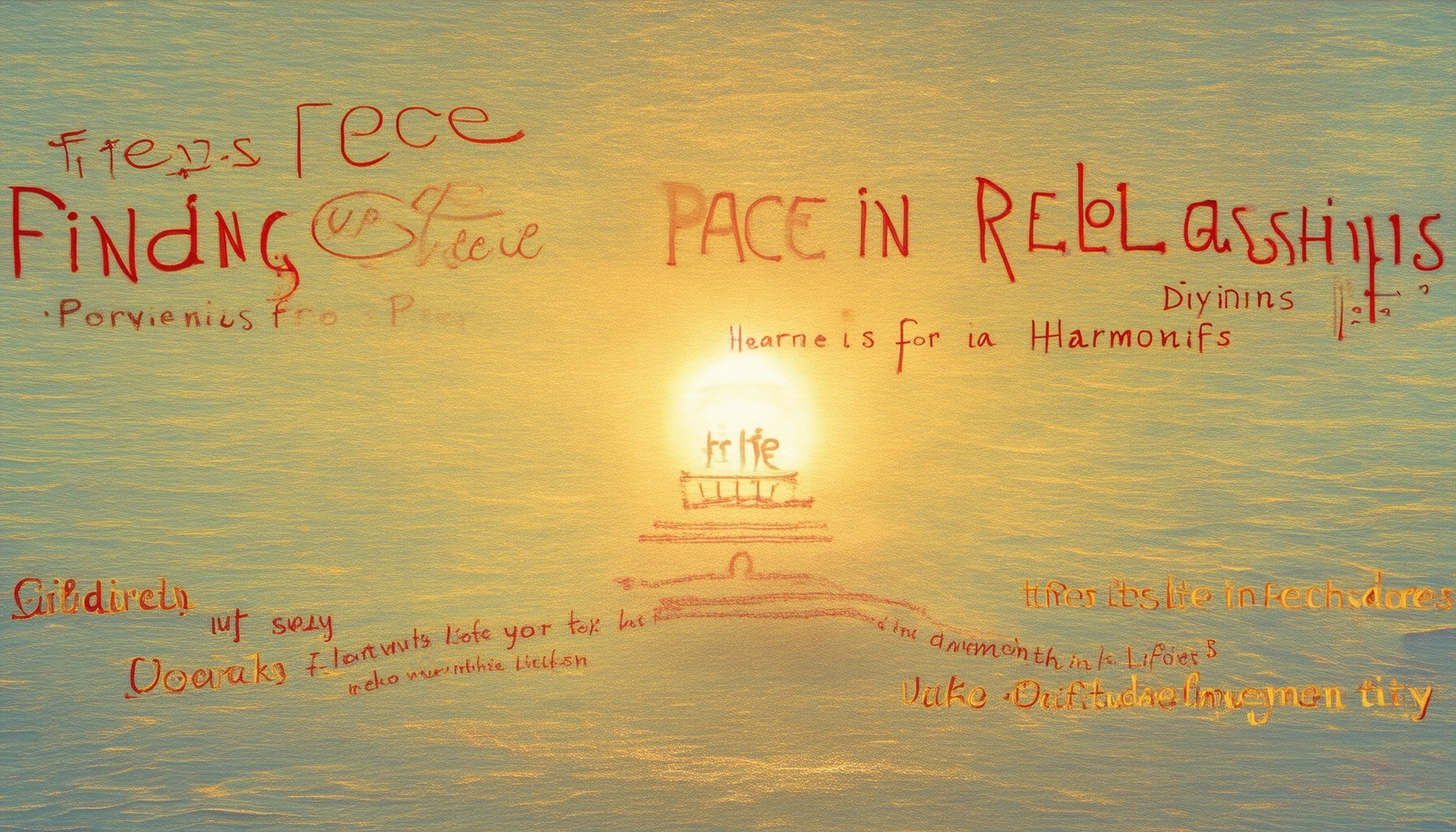Building harmonious relationships is a cornerstone of a fulfilling life, yet many seek proven strategies to foster peace within their personal connections. Whether navigating the complexities of communication or seeking ways to resolve conflicts constructively, understanding the foundation of peaceful relationships is crucial for creating a life filled with harmony and balance. This guide explores essential tips and insights designed to help you cultivate stronger bonds, emphasizing the importance of mutual respect, effective dialogue, and shared understanding. By addressing common challenges and offering practical solutions, we aim to provide actionable strategies that empower you to achieve lasting peace in your relationships.
Key Takeaways
– Prioritize Open Communication: Foster honest dialogue and active listening to build trust and reduce misunderstandings.
– Practice Empathy: Understand and share your partner’s emotions to strengthen connections and ease tensions.
– Build Mutual Respect: Value each other’s individuality and treat one another with dignity to cultivate a harmonious relationship.
– Foster Trust: Be consistent and transparent to create a secure foundation for peace.
– Forgive and Move Forward: Let go of past grievances to allow relationships to thrive.
– Align on Shared Goals: Strengthen your bond by working toward common objectives together.
– Spend Quality Time Together: Engage in meaningful activities to deepen your bond and reduce stress.
– Express Gratitude Regularly: Show appreciation to reinforce positive feelings and enhance your connection.
Improving Your Relationship for Peace
To foster peace in your relationship, consider implementing the following strategies:
- Enhance Communication : Make a conscious effort to listen actively and understand your partner’s perspective without interrupting. This helps in building empathy and fostering deeper connections.
- Cultivate Empathy : Strive to understand each other’s emotions and experiences. Show genuine concern and validate their feelings to strengthen emotional bonds.
- Practice Mutual Respect : Acknowledge and honor each other’s boundaries, preferences, and individuality. Respecting differences creates a foundation for collaboration and understanding.
- Build Trust Gradually : After experiencing betrayal, work on rebuilding trust through consistent reliable behavior and open communication. Patience and understanding are key.
- Compromise Effectively : Approach conflicts by seeking mutually beneficial solutions. Compromises can help reduce tensions and promote harmony.
- Forgive Constructively : Let go of grudges and focus on moving forward. Forgiveness doesn’t mean forgetting, but it allows both parties to grow individually and together.
- Spend Quality Time Together : Schedule regular activities, whether it’s shared hobbies or quiet conversations, to maintain a strong emotional connection.
- Stay Positive : Focus on the positive aspects of your relationship and approach challenges with optimism. This mindset can help navigate difficulties more smoothly.
- Seek External Support if Needed : Consulting with friends, family, or professionals can offer fresh perspectives and strategies to improve your relationship dynamics.
- Celebrate Small Wins : Acknowledge and appreciate the little things your partner does, which can boost morale and reinforce positive behaviors.
By integrating these practices into your daily life, you can work towards creating a more peaceful and harmonious relationship. Remember, consistency and mutual effort are crucial for long-term success.
Best Ways to Promote Peace in a Relationship
Building and maintaining peace in a relationship requires intentional effort and understanding. Here are proven strategies to foster harmony and reduce conflicts:
- Effective Communication : Open and honest dialogue is essential. Use “I” statements to express feelings without blaming your partner. Listen actively to understand their perspective.
- Mutual Respect : Treat each other with kindness and understanding. Acknowledge each other’s strengths and weaknesses, creating a foundation of mutual admiration.
- Active Listening : Pay full attention when your partner speaks. Show empathy by nodding or responding thoughtfully, allowing them to feel heard and valued.
- Compromise and Flexibility : Conflict is inevitable, but how you handle it matters. Be willing to compromise and adapt to each other’s needs for a peaceful resolution.
- Gratitude and Appreciation : Expressing thanks regularly strengthens bonds. Take time to acknowledge your partner’s efforts, big or small.
- Setting Boundaries : Clear boundaries protect emotional and physical well-being. Discuss expectations and agree on what behaviors are acceptable.
- Regular Check-ins : Schedule time to discuss relationship status. This helps address issues early and ensures both partners feel connected.
- Self-Care : A healthy individual thrives in a relationship. Prioritize your own well-being to contribute positively to the partnership.
By implementing these strategies, you can create a stable and fulfilling relationship built on trust, respect, and mutual growth. For more insights and tools to enhance your relationship, explore our comprehensive guide .
How to Achieve Peace in Your Relationship
To achieve peace in your relationship, consider implementing the following strategies:
- Effective Communication : Engage in open and honest dialogue, ensuring both parties feel heard. Practice active listening to avoid misunderstandings and foster mutual understanding.
- Empathy and Understanding : Strive to see things from your partner’s perspective. This approach helps in resolving conflicts and building deeper connections.
- Taking Responsibility : Acknowledge your role in the relationship while not excusing poor behavior. This balanced approach reduces tension and promotes growth.
- Setting Boundaries : Clearly define and communicate your needs to prevent feelings of being taken advantage of, fostering a healthier dynamic.
- Forgiveness : Work on releasing past grievances to focus on present happiness. This practice enhances emotional well-being and strengthens relationships.
- Building Trust : Be reliable and honest to cultivate a foundation of trust, essential for a peaceful partnership.
- Quality Time Together : Spend meaningful moments with your partner to strengthen your emotional connection and create a safe environment.
- Celebrating Each Other : Regularly recognize and appreciate your partner’s efforts, boosting confidence and reinforcing shared support.
- Addressing Issues Proactively : Face challenges head-on, whether through personal reflection or seeking external help, to resolve underlying issues effectively.
By focusing on these areas, you can cultivate a stable and fulfilling relationship, where both partners thrive together.
Key Factors for Achieving Peace in a Relationship
The foundation of peaceful relationships lies in several essential components that foster harmony and understanding. Here’s a breakdown of the key factors:
- Open Communication :
Effective communication is the bedrock of any healthy relationship. It involves expressing thoughts and feelings openly without fear of judgment. Active listening is crucial, allowing both parties to understand each other’s perspectives. Avoiding blame and focusing on solutions helps resolve conflicts constructively. - Empathy and Understanding :
Empathy allows you to step into the other person’s shoes, understanding their emotions and experiences. This fosters a sense of connection and reduces misunderstandings. Showing compassion and patience can significantly ease tensions and promote peace. - Mutual Respect :
Respect is the cornerstone of any lasting relationship. Treating each other with dignity and recognizing individuality ensures that both partners feel valued. Respecting boundaries and differing opinions encourages collaboration and prevents domination or control. - Trust and Reliability :
Trust is fragile and takes time to build. Being honest, consistent, and reliable builds a foundation of trust. Honesty fosters transparency, which is essential for resolving issues and maintaining peace. - Forgiveness and Letting Go :
Conflict is inevitable, but how you handle it matters. Forgiving past mistakes and moving forward creates a clean slate, allowing relationships to thrive. Holding onto grudges stifles growth and peace. - Shared Goals and Values :
Aligning on shared goals and values ensures that both partners are working towards the same objectives. This alignment strengthens the bond and reduces misunderstandings.
By nurturing these factors, relationships become more resilient and harmonious. Remember, peace isn’t just the absence of conflict but the presence of understanding and care.
Explore how to build stronger connections and learn more about fostering peace in your relationships.
Effective Steps to Create Peace in a Relationship
Building and maintaining peace in a relationship requires intentional effort and understanding. Here are some proven strategies to foster harmony and strengthen connections:
- Practice Open Communication : Engage in honest and respectful conversations. Listen actively to understand perspectives and express feelings without blame.
- Foster Emotional Support : Offer reassurance and empathy. Validate each other’s emotions and be present during challenging times.
- Resolve Conflicts Constructively : Address issues calmly and seek mutually beneficial solutions. Avoid bringing up past grievances unnecessarily.
- Build Mutual Respect : Treat each other with kindness and appreciation. Acknowledge individual differences and validate each other’s strengths.
- Prioritize Quality Time : Spend meaningful moments together through shared activities or simply being present.
- Express Gratitude Regularly : Share appreciation for small things to reinforce positive feelings and strengthen the bond.
For more insights, explore Chris and One’s comprehensive guide on relationship well-being.
What Are the Best Ways to Create Peace in a Relationship?
- Practice Open Communication: Addressing issues early and openly helps prevent misunderstandings. Use “I” statements to express feelings without blaming your partner.
- Be Empathetic and Understanding: Put yourself in your partner’s shoes and listen without judgment. This fosters mutual respect and connection.
- Listen Actively: Show genuine interest in your partner’s thoughts and feelings. Avoid interrupting and give them your full attention.
- Set Healthy Boundaries: Respecting each other’s space and time ensures both parties feel valued and secure.
- Spend Quality Time Together: Engage in activities you both enjoy to strengthen your bond and reduce stress.
- Let Go of the Past: Forgiving mistakes and moving forward creates a more harmonious environment.
- Show Gratitude and Appreciation: Regularly expressing thanks for your partner’s efforts can significantly boost your relationship’s peace.
For more insights, explore our guides on effective communication and understanding boundaries . These resources provide deeper understanding and practical steps to maintain peace in your relationship.
Loving your partner as they love you is the foundation of lasting peace. By nurturing these habits, you can build a stronger, more fulfilling connection.
Discover more tips to create peace in your relationship









0 Comments